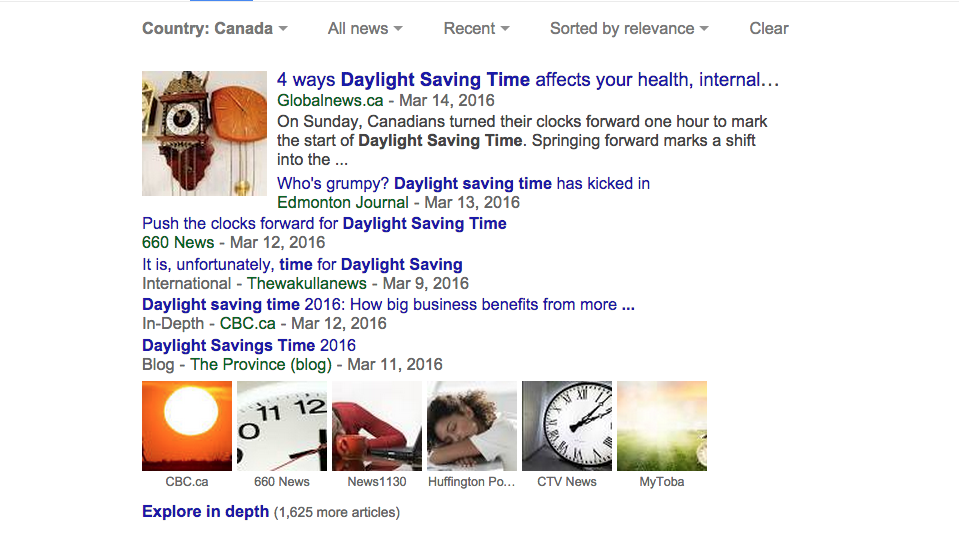Yawn-worthy coverage
Feeling sleepy? In case you couldn’t tell from your Twitter feeds or small-talk interactions this week, it’s daylight saving time again. It’s a yearly ritual each spring: set your clocks forward an hour, complain about how tired you are and, for journalists, write yet another story on the subject.
For the past few days, outlets have been pumping out articles about the missing hour—1,625 show up in a quick Google News search—including service-y reminders to make the switch, fun facts about the practice (did you know that certain communities in Ontario, Quebec, B.C. and Nunavut, as well as all of Saskatchewan, don’t use it?) and summaries of the research on its health effects. If you take the coverage seriously, there’s a long list of things you should be worried about this week: heart attacks, strokes and car accidents.

1,625 Canadian articles on daylight saving time. We can’t believe it either.
While I’m not saying the time change has no effect—it takes a few days for your circadian rhythm to adjust to the mini-jetlag and get back to a regular sleep schedule—the aggregate of stories presents a body of inconclusive evidence as something more ominous.
One of the studies most cited by journalists about car accidents in the days following daylight saving time was published in The New England Journal of Medicine in 1996, and it found a small (8 percent) increase in traffic accidents after the spring shift. That study was based on two years of data. But there are other studies that used larger sample sizes. A 2001 study in the journal Sleep Medicine based on 21 years of data found no effect in the spring and an increase in the fall, which the researchers attributed to people using the extra hour to stay up late and drink. A 2007 study from The B. E. Journal of Economic Analysis & Policy was based on 28 years of information and found no short-term effect on car accidents in the spring, as well as a decrease in the long term.
When it comes to heart attacks, many reporters cite a 2014 study from Open Heart, an online journal co-owned by The British Medical Journal, that did indeed find an increase in the number of people admitted for an acute myocardial infarction in Michigan hospitals after springing their clocks forward. But the number of people who received treatment in the surrounding weeks stayed constant. The same number of people had heart attacks overall; daylight saving time just influenced when they had one. Daylight saving time, the researchers wrote, “does not influence the overall incidence of this disease.”
Instead of writing about dramatic health problems, it’s more useful to focus on advice for getting back on track with a regular sleep schedule. But an even better conversation—which some journalists contributed to—would be why we even change the clocks in the first place. The official answer is to “save energy,” but there’s little evidence that this works, and it may even waste it as people drive around and keep their air conditioners on during their longer daylight hours. It seems like it’s mostly just tradition at this point, plus getting more enjoyable and bright summer evenings.
You’ve probably read these stories before too, though. Like the others, they get written year after year, even though nothing about the subject really changes. You might be better off taking a power nap.
Seriously though, we need to make the day after #DaylightSavingTime a national holiday.
— Norm Kelly (@norm) March 14, 2016
Related Posts
Elena is the chief copy editor of the spring 2016 issue of the Ryerson Review of Journalism.











































